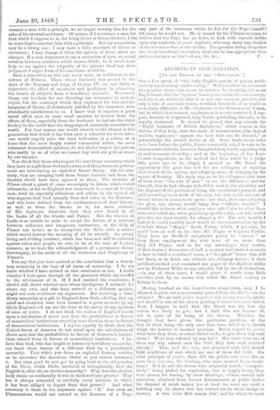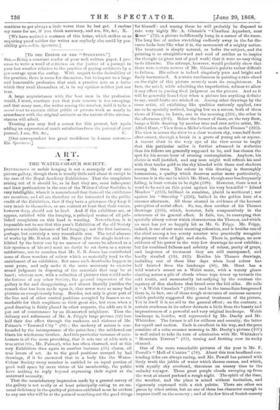ARCHITECTS' REMUNERATION.
and (2) as an architect, that it is not our common practice, but only a rule of one trade union, to which hundreds of us would as soon claim affiliation as Mr. Gladstone to the Stonemasons' Union, but to which Government employment is ucarly restricted, I sup- pose, because it happened, long before publishing this rule, to be royally chartered. It cannot be proved that any outside the " Royal Institute of British Architects," either concur in the dictum of that body, that this mode of remuneration (like that of modern engineers) "appears the best that can be devised," or acknowledge the absurd device at all. Since trade-union rules have been before the public, I have constantly asked in vain to be shown a rule of theirs, from the Sawgriuders upwards, equalling this in anti-economic absurdity ; and at the beginning of the Law- Courts competition, as the method had been ruled by a judge fifty years ago to be illegal, I pressed on Mr. Street the opportunity this gave him and his ten colleagues of washing their hands of the system, and adopting mine, of charging by the square of flooring. His reply was, as to his colleagues, that none of them were "time sort of men " to see the difference, and for himself, that he had always indeed felt acutoly the absurdity and the disgrace of time position of being the contractor's partner, and paid according to no work of his own, bat only to the amount of others' labour it causes to be spent ; but that, after once adopting the plan, any change would bring him " infinite trouble." I should like to know what employer ever asked him to adopt it,— none ever asked rue, when practising equally early,—or who would give him the least trouble for chauging it? The sole trouble I believe he could possibly incur would be excommunication by the Conduit Street " Royal " Trade Union, which, I presume, he could bear as well as the late Mr. Pugin or Captain Fowke. They have no Sheffield sawgriuder power to " ratten " or keep from employment the very least of us, more than they did Pugin ; and as for any advantages they confer, if their learned discussions of half a century had evolved so much as how to build a ventilated room, a " fire-proof " house that will not burn, or to finish one without the chimney doctor ; if their publications had ever contained one paper of the slightest utility not by Professor Willis or any outsider, but by one of themselves, —in any of those cases, I would grant it worth some little sacrifice (but by no means that which Mr. Street makes) to belong to them.
Having touched on the Law-Courts competitiou, may I be allowed to point out a monstrosity quoted frotu the Builder on the subject? We are told justice required that in any case the archi- tect should be one of the eleven privileged triers that have failed. Now, I happen to hold that Mr. Street was the best the nation was likely to get ; but I hold this not because of, but in spite of his being of the eleven. Whether the thought they have given this particular problem, or the fact of their being the only ones that have failed in it, should weigh the heavier is another question. But in regard to justice what have they done, or others failed to do, to give them any such claim ? Were they selected by any test ? Has more than one of them any way earned even the 800/. they have each received already ? This, and this only, was promised each who should fulfil conditions of cost which not one of them did fulfil. On what principle of justice, then, did the public owe even this to more than that due, Mr. Garling, who came nearest those condi- tions? If it be said the eleven were originally tested, " competi- tively " being picked for reputation, that is simply to say they were chosen for having, by show drawings, seldom carried into execution, obtained from former Governments or public bodies the disposal of much money (so at least we must say until a building may be shown that has carried out its whole design as drawn). A true John Bull reason this ! and for which he must
depreciate the effect of meanness and profligacy n alienating two popular errors this seems to involve, by observing (1) as an the hearts of subjects from a hereditary monarch. NI e cannot Englishman, that the "system" is not quite confined to our country; [We have omitted a sentence of this letter, which strikes us as requiring proof neither the writer nor anybody else could by pos- sibility give.—ED. Spectator.]



































 Previous page
Previous page